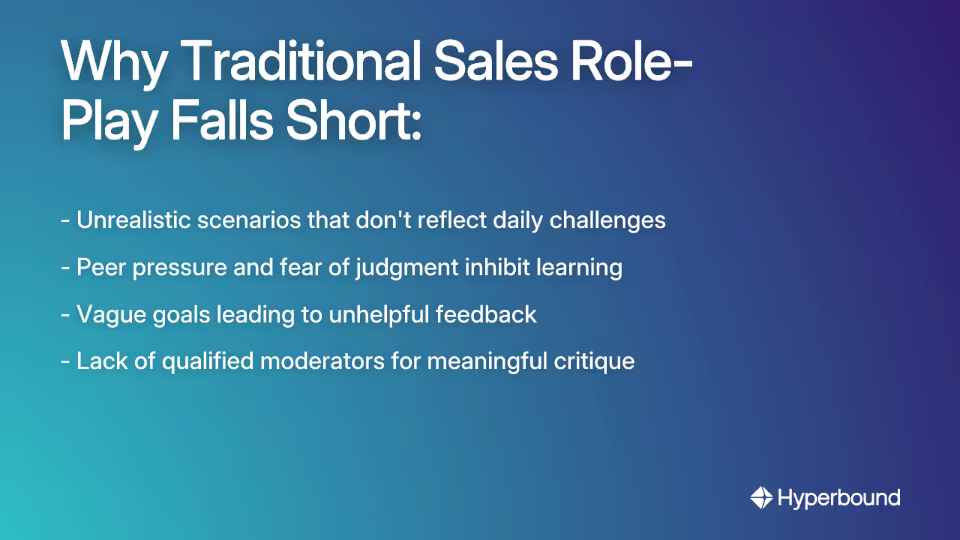
You've been there before. The sales manager announces it's time for "role-play practice," and a collective groan ripples through the room. If the phrase "sales role-play" makes you cringe, you're not alone.
For many sales reps, role-playing feels like "performance theater for middle managers" without real-world relevance. As one frustrated sales rep put it: "If I could act well enough for role play to be effective, I'd be doing that instead of sales."
But here's the truth: The problem isn't role-play itself—it's how most companies implement it. When done right, role-playing isn't about acting; it's about creating realistic simulations that build specific skills and confidence.
This article breaks down why traditional sales role-play fails and provides a blueprint to transform these sessions from awkward, ineffective exercises into powerful training tools your team will actually value.
The Diagnosis: Why Most Sales Role-Play is Ineffective "Busywork"

It's Not You, It's the Scenario: The Unrealistic Setup
The number one reason role-plays fail is a lack of realism. Your sales reps disengage when scenarios don't reflect their daily challenges.
As one sales rep candidly shared: "You can't recreate a live customer meeting because there's so many factors that go into how a conversation goes."
Common scenario failures include:
- Generic "customer" personas that don't match actual buyers
- The role-playing partner who plays the "closed off, quiet, no opinion customer," leading to useless feedback like "you're talking too much"
- Scripted scenarios where the "customer" anticipates the rep's every move, turning the exercise into a memory game rather than a skill-building opportunity
When role-plays feel artificial, they become what many reps describe as "busywork" rather than valuable training.
The Awkwardness Factor: Peer Pressure and Lack of Psychological Safety
Even well-designed role-plays can fail when they ignore the human element of peer awkwardness and fear of judgment.
Reps feel self-conscious performing in front of colleagues, which hinders their ability to take risks and learn. Without psychological safety—an environment where team members feel safe to be vulnerable without fear of negative consequences—training feels punitive rather than educational.
"It always feels like everyone is just trying to memorize their lines and not embarrass themselves," explains one sales professional. This performance anxiety transforms what should be a learning opportunity into a stressful evaluation. This is where modern tools can help. For instance, AI role-play platforms like Hyperbound provide a private, judgment-free space for reps to practice without fear of peer critique.
Aimless Practice: The Problem of Vague Goals and Unhelpful Feedback
Many role-plays are doomed from the start because they lack specific objectives and structured feedback mechanisms.
When sessions have no clear goals, reps don't know what success looks like, and the exercise feels pointless. This leads to vague, unhelpful feedback that reps hate: "Most of the feedback given is vague and unhelpful. You hear things like 'you need to work on closing,' but no one explains how."
The problem is compounded by a lack of qualified moderators who can provide meaningful, specific critiques. Without expert guidance, role-plays become a case of the blind leading the blind. AI coaching platforms solve this by offering objective, data-driven feedback on every practice session, ensuring critiques are always targeted and actionable.

The Fix: A Manager's Blueprint for Role-Play that Actually Works

Foundation First: Create a Psychologically Safe Arena
Before any role-play begins, set the stage for safety and learning:
- Lead by Example: Managers or senior leaders should perform the first mock call in a "Showcase Role-Play." This demonstrates vulnerability, sets a standard, and shows it's okay not to be perfect.
- Establish Ground Rules: Explicitly state that the goal is learning, not judgment. Emphasize that mistakes are expected and are the primary vehicle for improvement. According to research, teams that establish psychological safety see dramatically better results in training scenarios.
- Foster Peer Support: Encourage a culture where teammates support each other through constructive feedback. Implement buddy systems where experienced reps can guide newer ones in a non-threatening environment.
Ditch the Script, Embrace Realism: How to Build Authentic Scenarios
The core of effective role-play is authenticity:
- Use Real Customer Data: Base scenarios on actual customer interactions, common objections, and frequent sticking points from your CRM. The goal is to "practice the way you actually sell." This is where AI excels; platforms like Hyperbound can analyze your team's real call recordings to automatically generate hyper-realistic role-play scenarios.
- Create Detailed Customer Personas: Equip the person playing the customer with a thorough persona, including their specific pain points, motivations, and a list of realistic objections they should raise. Create industry-specific scenarios that mirror real-world situations your team faces.
- Prepare Both Sides: Don't just focus on the rep—the "customer" needs clear guidance too. This prevents the "closed off, no opinion customer" problem that makes role-plays feel artificial.
From "Busywork" to Deliberate Practice: Structure, Focus, and Feedback
Transform role-play from a vague activity into a focused simulation for skill development:
- Set Specific, Narrow Goals: Don't try to fix everything at once. Focus on one or two specific skills per session, such as "improving the value proposition" or "handling the 'it's too expensive' objection." This concept, known as deliberate practice, makes success measurable and reduces pressure.
- Allow Prep Time: Give reps a few minutes to prepare before the mock call, just as they would for a real customer meeting. This reduces anxiety and improves performance.
- Record and Review: When possible, use call recording software to capture the role-play. This turns feedback from "you need to work on closing" to "at the 3:45 mark, when the customer mentioned budget, here's another way you could have responded." Advanced tools like Hyperbound's AI Real Call Scoring can even automate this process, scoring role-plays against your custom playbook and providing instant, granular feedback.
Make it Stick: Reinforcement and Consistency
Role-play shouldn't be a one-off "event." It must be an integrated part of your coaching culture:
- Adopt Spaced Learning: Don't cram training into a single boot camp. Integrate regular, short role-play sessions into weekly team meetings. This approach, known as spaced learning, reinforces concepts over time and builds muscle memory.
- Make it a Habit: Regular practice increases comfort and skill retention. The more reps engage in role-play, the less awkward it becomes and the more natural their cadence will be with real customers. Platforms that offer on-demand AI Sales Roleplays make it easy for reps to build this habit on their own schedule, without waiting for team sessions.
- Provide Reinforcement: Follow up with reference materials and ongoing coaching from managers to ensure the skills learned in role-play are applied in the field.
Putting It Into Practice: Actionable Role-Play Scenarios & Formats
Ready-to-Use Scenarios for Key Skills
Here are concrete examples that managers can implement immediately:
Discovery Call Scenario:
- Goal: Practice active listening and asking effective follow-up questions.
- Setup: The rep must ask, "What are your top challenges today?" and then dig deeper without immediately pitching.
- Customer Persona: A prospect who mentions surface-level problems but has deeper issues they'll reveal only if properly questioned.
Objection Handling Scenario:
- Goal: Master a framework for handling the "we're happy with our current provider" objection.
- Setup: The customer is briefed to present this common objection, requiring the rep to acknowledge, explore, and reposition.
- Success Metric: The rep's ability to uncover the underlying concerns without becoming defensive.
Closing Trial Scenario:
- Goal: Practice moving from demonstration to securing a commitment.
- Setup: The customer has seen your product and is interested but not explicitly ready to commit.
- Success Metric: The rep's ability to identify buying signals and confidently suggest appropriate next steps.
Structured Formats to Maximize Learning
Different formats keep sessions engaging and effective:
- Dyad Role-Play: Two people (rep and customer) practice a scenario. Good for quick, focused practice.
- Triad Role-Play: Adds a third person as an observer who provides structured feedback afterward based on the session's specific goals. This creates a dedicated feedback loop.
- Fishbowl Role-Play: One small group performs while others observe. Afterward, the observing group discusses what worked and what didn't. Great for team-wide learning on complex scenarios.
From Cringe-Worthy to Confidence-Building
Effective sales role-play isn't about acting—it's a structured simulation that builds real-world skills. By creating psychological safety, using authentic scenarios, focusing on specific skills, and providing structured feedback, you can transform role-playing from dreaded busywork into a powerful training tool. Leveraging AI-powered platforms can automate and scale these best practices across your entire team.
Remember: well-executed role-play is one of the most effective ways to build your sales team's competence, confidence, and collective cadence. When done right, it doesn't just prepare reps for customer conversations—it gives them the confidence to excel in them.
Frequently Asked Questions
Why do most sales role-plays fail?
Most sales role-plays fail because they are built on unrealistic scenarios, create peer pressure, and lack clear goals. This combination makes them feel like awkward, ineffective "busywork" rather than valuable training. To be effective, role-plays must use authentic customer situations, foster a psychologically safe environment, and focus on developing specific, measurable skills.
What is the most important factor for effective sales role-play?
The most important factor for effective sales role-play is psychological safety. Without a judgment-free environment where reps feel safe to make mistakes, they become too focused on "performing" for their peers and managers. When psychological safety is established, reps can be vulnerable, take risks, and genuinely learn from the experience.
How can I make role-play scenarios more realistic?
To make role-play scenarios more realistic, base them on real customer data and interactions from your CRM or call recordings. Ditch generic scripts and instead use common objections, pain points, and challenges your team actually faces. Creating detailed customer personas with specific motivations also prevents the exercise from feeling artificial and ensures the practice is relevant.
How often should a sales team conduct role-play practice?
A sales team should conduct role-play practice consistently, integrating short, focused sessions into their regular routine, such as weekly team meetings. This "spaced learning" approach is more effective than cramming training into a single event, as it reinforces skills over time, builds muscle memory, and makes practice a normal, less awkward part of the team's culture.
What are the benefits of using AI for sales role-play?
Using AI for sales role-play provides a private, scalable, and judgment-free space for reps to practice anytime, which eliminates peer pressure. AI platforms can also analyze real call data to create hyper-realistic scenarios and deliver instant, objective, data-driven feedback, ensuring critiques are always specific and actionable.
How do you measure the success of a role-play session?
The success of a role-play session is measured by its focus on a specific, narrow goal. Define a clear objective beforehand, such as "mastering the 'it's too expensive' objection." Success is then determined by the rep's ability to apply the target skill or framework during the simulation, which can be assessed through structured peer feedback or automated scoring from an AI platform.
How can managers get sales reps to buy into role-playing?
Managers can get sales reps to buy into role-playing by leading by example and proving its value. Start by performing the first mock call yourself to demonstrate vulnerability and set a non-judgmental tone. When you use realistic scenarios that solve reps' daily challenges and clearly state that the goal is skill development, not evaluation, they will see the exercises as a valuable use of their time.

Book a demo with Hyperbound
.png)













